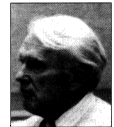Walter W. Jacobs
Born September 26, 1914, Newark, N.J.; died February 11, 1982; mathematician, cryptologist, and statistician who provided the environment in which George Dantzig and others created linear programming.

Education: BS, mathematics, City College of New York, 1934; MA, mathematical statistics, George Washington University, 1940; PhD, mathematical statistics, George Washington University, 1951.
Professional Experience actuarial mathematician, Railroad Retirement Board, [Jacobs' activities between 1934 and 1937 are unknown. It was the height of the depression and it is possible that he either was unemployed or worked a series of less professional jobs.] 1937-1941; Army Security Agency, 1941-1947; Arlington Hall Station, US Army, 1941-1945; Government Code and Cypher School (GCCS), Bletchley Park (England), 1944-1945; chief, Production and Markets Section, US Dept. of Commerce, 1947-1951; deputy chief, Computation Division, US Air Force, 1951-1957; National Security Agency, Fort Meade, Md.: deputy, Office of Mathematical Research, deputy chief, Office of Research, chief, Office of Machine Processing, 1961-1963, 1964-1966, commandant, National Cryptologic School, 1966-1969; visiting staff member, Institute for Defense Analysis, 1963-1964; American University: faculty member, 1969-1981, chairman, Department of Mathematics, 1969-1972.
Honors and Awards: Beldan Medal, CCNY, 1934; Legion of Merit, War Department, 1945; Air Force Medal for Exceptional Civilian Service, 1956; Exceptional Civilian Service Award, 1968.
Jacobs, like others who were involved in intelligence work during World War II, will probably never be adequately credited with his contributions to the field of computation and its usage in special problems. He was given several awards by branches of the US government for his service. Jacobs' wartime activities saw him spend a short period at Bletchley Park in England, although the major recorded activity of that period was his playing chess on board six in a challenge of the Oxford University chess club by the Bletchley Park regulars, including Jack Good and Hugh Alexander. Following the war, Jacobs took on a series of administrative positions at the US Department of Commerce, the US Air Force, and the National Security Agency. While with the Air Force, he installed their first Univac I, and pioneered the application of the computer to management problems. Later while at the National Security Agency he oversaw the development of software for the IBM-developed Harvest system, including the large-scale operating system, a high-level language, and an assembly-language system. After retiring from the NSA, Jacobs undertook an academic career at American University. With his brother, Morton Jacobs, Walter was instrumental in establishing the patentability of embedded software systems in 1975 before the US Supreme Court.
BIBLIOGRAPHY
Biographical
Blum, Joseph, Robert L. Kirby, and Jack Minker, "Eloge: Walter W. Jacobs, 1914-1982." Ann. Hist. Comp., Vol. 6, No. 2, 1984, pp. 100-101.
Significant Publications
Jacobs, Walter W., Random Matrices, PhD thesis, George Washington University, 1951.
New content Copyright © 2013-2023 by the IEEE Computer Society and the Institute of Electrical and Electronics Engineers Inc.
All rights reserved. This material may not be reproduced or redistributed without the express written permission of the copyright holder.
